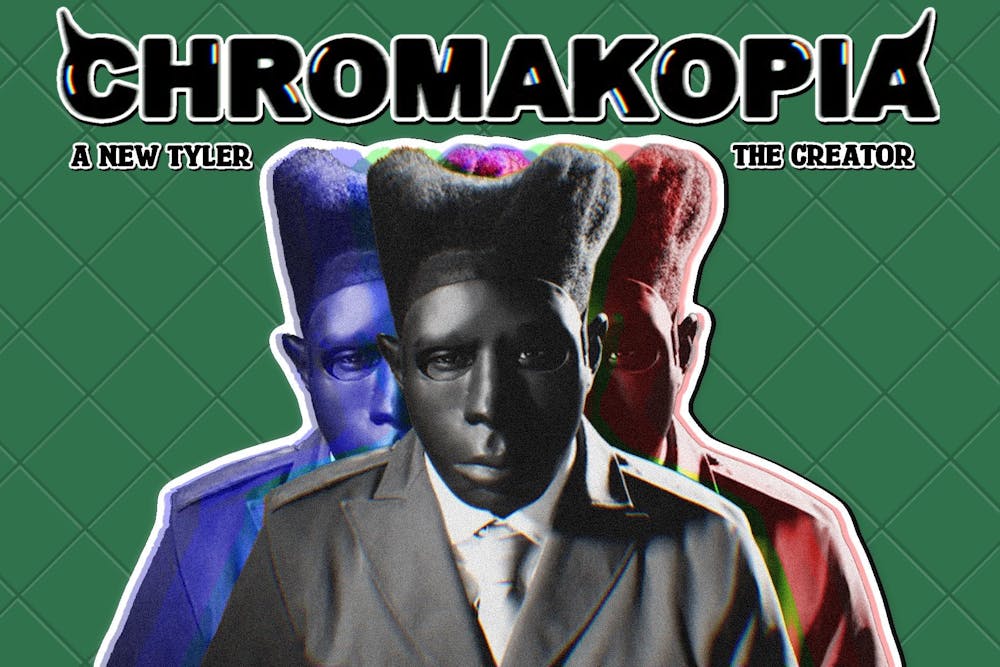I was hesitant to listen to Tyler the Creator’s newest album, “CHROMAKOPIA” — not only because he broke his two year album cycle to release it as a surprise, but also because stans were quick to publish their theories about the artists and sounds rumored to be on his eighth studio album. As I read the online discourse, I found myself uninspired and questioning why there wasn’t more to include in the conversation about Tyler the Creator’s music than potential features from other artists. Naturally, I waited to press play on the opening track, “St. Chroma,” and wondered, “What side of Tyler the Creator have we not seen yet?”
Not only was a new side of his work revealed, but the album felt as if a veil was being ripped away from my understanding of his character — he suddenly became three-dimensional.
The project operates as a conversation between Tyler the Creator and Tyler Okonma. Even in early tracks like “NOID” and “DARLING, I,” it feels as if Tyler is sitting in front of a mirror and talking to himself, having an honest conversation about the man he sees in the mirror, not the one that faces crowds in person and online. “NOID” is especially interesting in this regard — currently, it is the only song with an accompanying visual, showing a crazed fan (played by Ayo Edebiri) waving what flashes between a phone camera and a gun. As a masked Tyler runs into the assumed privacy of his home, he takes off his mask only to again be confronted by a figure armed with a phone and a gun.
In this song and much of the album’s nearly hour-long runtime, Okonma seems to be trying to create a boundary between the person he is and the character he must perform for the world, with this divide getting increasingly blurred as the track list runs by. Intrusive thoughts (personified by his mother, Bonita Smith) also begin to crop up in songs like “Hey Jane.” Okonma experiences a pregnancy scare with his unnamed partner, calling into question his braggadocious and larger-than-life lyrics while grounding him in the reality of being raised by a single mother himself. These insecurities about not knowing the full details of his origin feel like a portent of potential self-destruction, leading into track six, “I Killed You.” He raps, “Feel ashamed, so we straightened you out. / Without a doubt, b***h, I killed you.” But this cutthroat mentality is clearly only an internal process, as he outlines in the album’s next song, “Judge Judy.” He refuses to judge an unnamed woman for her past, also referencing 2021’s “CALL ME IF YOU GET LOST.”
This first half of the project sets up the listener for a beautifully chaotic — or “Sticky”— second half, with Okonma attempting to rebel against himself. In “Sticky,” which opens with a declaration against gender conventions, he raps that he doesn’t “give a f**k ‘bout pronouns.” Until “Take Your Mask Off,” mantras like “I hope you find yourself” and “I hope you take your mask off” are the only breaks listeners receive from the stressors of Okonma’s life.
But no revelation hits as hard as “Like Him,” which finds Tyler back in the space the album began with. He’s pleading with any force that hears him, trying to answer a question: Does he look like his father? These pleas shift from cries to screams as the song continues, and its message shifts from the reason he doesn’t know his father to the reason his father abandoned him. And just as it seems he’s given up, a voice steps in to answer his question, declaring that she was the reason his father was absent from his life. As his mother’s voice cracks, and as the identity of the woman he’s been unable to name comes together — the real ghost in the corner of the room — he realizes the origin he was unable to trace this whole time has been his mother.
Even as the final track — “I Hope You Find Your Way Home” — plays, and as he attempts to rap over it, there’s a vulnerability in the way he breathes, as if he’s shedding the skin of the person he’s pretended to be and accepting the fact that Tyler the Creator and Tyler Okonma are not a venn diagram — they’re a circle.
To say I was shocked when listening to this album would be an underscore. What I didn’t anticipate was the way he simultaneously held a mirror up to himself and the listeners, declaring “I Hope You Find Your Way Home” not only as the key to his freedom but as an opportunity for you to get the same.










